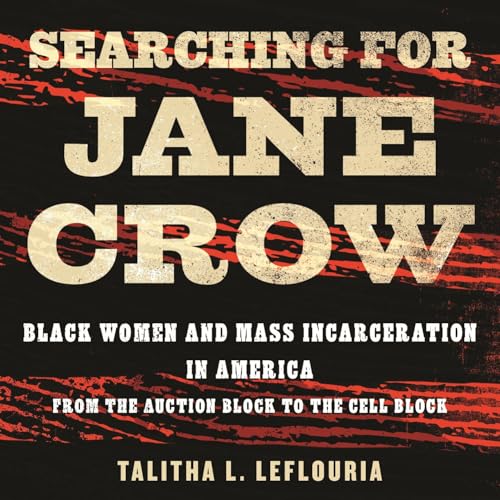
Searching for Jane Crow
Black Women and Mass Incarceration in America from the Auction Block to the Cell Block
Échec de l'ajout au panier.
Veuillez réessayer plus tard
Échec de l'ajout à la liste d'envies.
Veuillez réessayer plus tard
Échec de la suppression de la liste d’envies.
Veuillez réessayer plus tard
Échec du suivi du balado
Ne plus suivre le balado a échoué
0,00 $ pour vos 30 premiers jours
OFFRE D'UNE DURÉE LIMITÉE
0,99 $/mois pendant vos 3 premiers mois
L'offre prend fin le 16 décembre 2025 à 23 h 59, HP.
Exclusivité Prime: 2 titres
gratuits à choisir pendant l'essa. Des conditions s’appliquent.
Vos 3 premiers mois d'Audible à seulement 0,99 $/mois
1 nouveauté ou titre populaire à choisir chaque mois – ce titre vous appartiendra.
L'écoute illimitée des milliers de livres audio, de balados et de titres originaux inclus.
L'abonnement se renouvelle automatiquement au tarif de 0,99 $/mois pendant 3 mois, et au tarif de 14,95 $/mois ensuite. Annulation possible à tout moment.
Choisissez 1 livre audio par mois dans notre incomparable catalogue.
Écoutez à volonté des milliers de livres audio, de livres originaux et de balados.
L'abonnement Premium Plus se renouvelle automatiquement au tarif de 14,95 $/mois + taxes applicables après 30 jours. Annulation possible à tout moment.
Précommander pour 34,21 $
-
Narrateur(s):
-
Auteur(s):
-
Talitha L. LeFlouria
À propos de cet audio
Historian Talitha L. LeFlouria centers Black women at the core of a fresh argument: that the system of mass incarceration was established as protection for the institution of slavery and the profits of enslavers and that this legacy continues today.
For centuries, Black women in America have experienced extreme rates of arrest, conviction, and incarceration in the nation’s jails and prisons, yet their experiences have often been overlooked in favor of Black men’s.
Arguing that the merger between profit and punishment continues to keep Black people bound, LeFlouria traces the connection between enslavement and incarceration, revealing how they have always been intertwined--from the domestic slave trade of 1810-1865, when more than one million people were incarcerated in privately owned slave jails, to the post-Civil War era when Black people were enslaved through new systems of state-sponsored mass incarceration, and through to today.
Using archival sources and personal testimonies, LeFlouria tells a new origin story of mass incarceration with the stories of numerous Black women throughout history, including:
• Delia Garlic, who was incarcerated in a slave jail and later sold to a sheriff at the height of the domestic slave trade
• Eliza Purdy, who was jailed and sold to the highest bidder a year after the Civil War ended, and
• Susan Burton, who was commodified and trafficked through a 20th-century cell block, much like an enslaved person on the auction block 200 years prior.
Pas encore de commentaire



